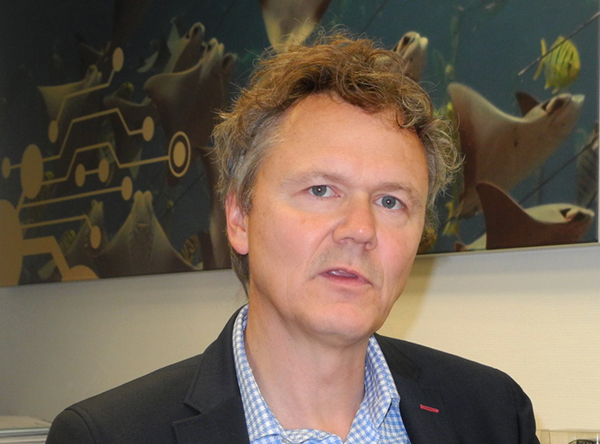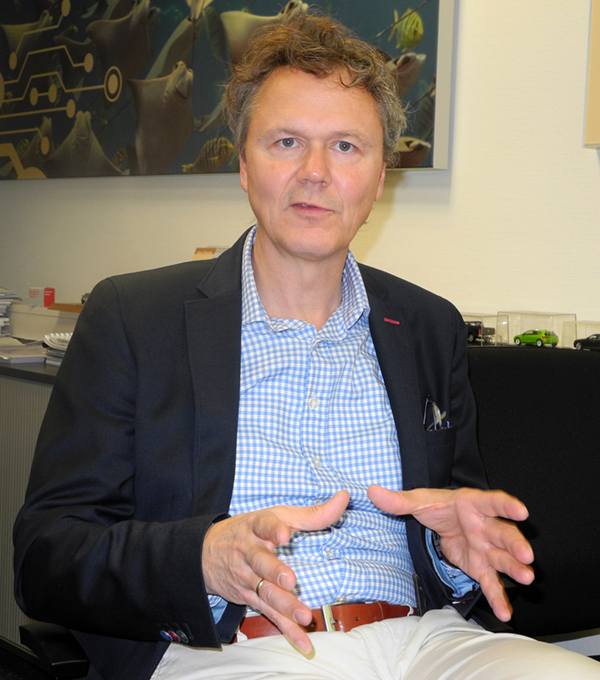
|
|
In the middle of 2016, a group of experienced PLM specialists published a position paper on the future of PLM in the age of digitalization. The theses served Audi as a guideline for redesigning the PLM landscape and PLM processes in the drive towards systems engineering. Thomas Kriegel, Head of Process and Methods Development for Systems Engineering at Audi, explains their practical benefits. 
Question: You recently said that the current development processes are not keeping pace with the exponential development of products and services. What did you mean by that? Kriegel: Nowadays, we have a sense of exponential development in all areas, both technically and technologically. This is because the intervals at which innovations come onto the market are becoming ever shorter. And if you want to get the kinds of developments that also influence and reinforce each other – such as electromobility and autonomous driving – onto the roads, you also need an exponential form of organizational and procedural adaptation. This presents us with huge challenges. Question: And systems engineering is your approach of choice for meeting these challenges? Kriegel: That's right. We not only want to use systems engineering to make the complexity of product development more manageable but also to ensure that our development steps are traceable, which is particularly important for new fields such as autonomous driving. For some time now, Audi has been using systems engineering methods to develop individual functions. However, when developing more complex products such as highly automated driving systems, it is no longer enough to simply use these methods to develop individual functions. We have to connect them to the backend IT system and thus to connected car services, and possibly also integrate third-party providers. To do this, we have to ensure that all the disciplines use the same methodology when deploying systems engineering. 
Question: What role did the Future PLM theses play in the "Audi Systems Engineering" initiative? Did they simply provide food for thought or did they actually serve as a guideline? Kriegel: Audi Systems Engineering addresses three interwoven aspects: processes, methods and IT tools. PLM only reflects one facet, namely that of the tools. The PLM theses on the other hand go far beyond the realm of traditional tools and cover a wide range of other aspects that are of importance to us. They have helped us to round off the content of our program. In my opinion, the position paper covers all the keys to success that need to be considered. Question: How did you come across the theses? After all, they were not widely publicized. Kriegel: We are a member of the prostep ivip Association, which published the theses, and we maintain a close relationship with the Association. But I would have liked to see them promoted with greater self-confidence because they have a lot to offer. The theses provide a basis for discussing a whole range of in-company and cross-company approaches to projects. Question: Which of the theses were particularly helpful to you? Kriegel: We felt that the theses dealing with digital transformation were very important because cultural change is a key success factor, even if it is difficult to grasp. Simply discussing the technology is not enough because we at Audi have to take around 10,000 employees involved in technical development with us on the same journey. Another thing that was a great help to us was the unequivocal statement that monolithic systems have had their day. This was very helpful as many people still cling to the notion that it is possible to solve everything with one particular system. We have made it clear from the outset that a monolithic approach cannot work and that instead many different processes and tools will need to act together in harmony. And this insight made it clear that we would not be able to deliver results with just a few employees. Instead, we would have to actively involve several hundred staff. Question: What will the PLM architecture look like in the future and how do you want to deal with the problems between old and new? Kriegel: That is what we are currently defining in our Audi Systems Engineering program. And we are doing so as part of the VW Group. Legacy systems are not only to be found within the brand but also within the VW Group, which means we have a greater level of complexity than other OEMs. We are constantly experiencing collaboration in new constellations within the Group, involving joint ventures or affiliated partners, and we have to harmonize our systems with each other every time. That is why we can no longer afford self-contained PLM architectures. Without complying with open standards, it would no longer be possible for us to work within the Group. Which is why we demand openness as laid down in the Code of PLM Openness. Question: Is this already taken into account during procurement? Kriegel: When we award contracts to new PLM vendors nowadays, this is one of our primary concerns when it comes to the requirements specifications. It is an absolute must as far as we are concerned. We are using pretty much everything available on the PDM and PLM markets in the VW Group, which means that we constantly need to ensure that competing systems also interact with each other. Question: One of the theses calls for Future PLM to be a management matter. Is this the case at Audi? Kriegel: Absolutely. We have launched a major transformation initiative that focuses on systems engineering with the aim of getting us in shape for the serious demands of issues such as autonomous driving. It is organized within the Technical Development division and we report to the divisional directors. We are redesigning and systematically digitalizing the development processes. This will also have an impact on who we hire in the future. It is intended that systems engineering actually drive the transformation process in our company and not merely facilitate it. Question: One of the theses is that Future PLM should not stop at company boundaries. How do you intend to integrate your suppliers in systems engineering? Kriegel: On the one hand, we want to provide greater support to the standardization initiatives of the prostep ivip Association and the VDA with regard to the exchange of SE artifacts. We need standards such as FMI (Functional Mockup Interface), which we will design together with our suppliers and other automotive OEMs. On the other hand, we want to integrate selected suppliers and their best practices into our architecture right from the start. There are some that we can learn from and others who can learn from us, and we want to shape this process within a community. In the past, we often regarded standardization as a supplementary task but need to rethink this approach. We now see it as a cornerstone of our work. Question: You have also taken up the thesis that Future PLM should not be an IT project. What does that mean as far as your approach is concerned? Kriegel: We want to move away from the pure waterfall model and become agile when it comes to developing our processes, methods and tools (PMT). In other words, we want to use sprints to define the process standards together with all the relevant stakeholders in workshops lasting two to three weeks. The participants must therefore have the authority needed to issue guidelines so that they can introduce all this into their specialist departments. We do this in what we call "process workshops" and "project houses", which define new processes, e.g. for requirements management, on a daily or weekly basis and commit themselves to adhering to these processes. This allows the IT department to create the first MVPs (Minimal Viable Products) and present them to workshop participants. The aim is not always to define the final state immediately but rather to describe 80 percent of the functional scope with 20 percent of the effort, to let it flow into IT, to put it into practice and test it, and only then to take the next step. This is a completely different approach. Processes, methods and tools are interconnected in a highly complex manner and must be implemented iteratively. It's all about speed. Question: In your opinion, which theses need to be refined? And where are theses perhaps lacking? Kriegel: To be honest, I think that the position paper pretty much covers everything. In our experience, it not only opens up scope for discussion with experts but is also very valuable when communicating with top management. Perhaps we can work together with the prostep ivip Association in the future to add best practices and concrete use cases to the theses. Mr. Kriegel, thank you very much for this interview. We wish you every success. (This interview was conducted by Michael Wendenburg) 
Born in 1966, Thomas Kriegel has worked for AUDI AG since 1994 and has been head of process/method development in the Technical Development division since 2008. In 2017, he also assumed responsibility for the Audi Systems Engineering program, which he initiated. Prior to this, he held a variety of positions involving the development of complete vehicles and chassis. Kriegel studied engineering mechanics at the Technical University of Dresden and completed an MBA in Augsburg/Pittsburgh. He is married with two sons. Outside of work, he is an enthusiastic photographer and chess player. |
|
| © PROSTEP AG | ALL RIGHTS RESERVED | IMPRESSUM | DATENSCHUTZERKLÄRUNG | HIER KÖNNEN SIE DEN NEWSLETTER ABBESTELLEN. |

